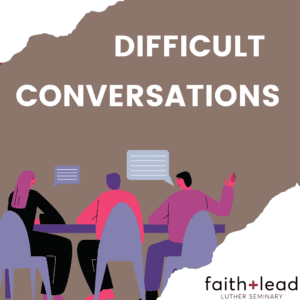I threw my SUV into reverse, backed out of the driveway faster than I should have, and drove away from my home muttering about how relationships would work a lot better if some people would learn how to communicate. Had there been a surveillance camera in our kitchen, it most likely would have captured my husband muttering the same thing. Fortunately, I was heading toward a Sunday adult forum that would be focusing on how to improve family communication. Unfortunately, I was the one who would be teaching that adult forum.
I was pretty sure that God was chuckling. It never seems to fail that, when I am scheduled to teach about some tricky predicament of our human experience, I find myself caught in that very predicament. The result? Sometimes feeling deeply empathetic with my listeners, sometimes feeling like a total imposter, but mostly feeling like there must be a way out of that predicament and it’s worth the struggle to figure it out. So here I am writing about difficult conversations while they are happening all around me. And I think it’s worth the struggle to figure them out.
The problem of relational fundamentalism
One of the biggest relational challenges we face as we attempt to engage in difficult conversations is what I call relational fundamentalism. I am not talking here about fundamentalism as the content of an individual or group’s religious or political beliefs, but about fundamentalism as process, as an approach to making sense of life. It refers to the way that a worldview can take precedence over a relationship. The meaning-making process is characterized by rigidity, fear, and exclusion. It’s as if we are saying to the other, “I’d rather be right than be in relationship with you.”
Fundamentalism as a relational process is important to look at because of the potential it holds for rupturing and cutting off relationships. This can be seen in congregations, families, institutions, almost any place where a group of people are involved in constructing and interpreting meaning. In this regard, we could identify relational fundamentalism in groups of clergy, journalists, educators, philosophers, politicians, sports fans, knitting enthusiasts—because it is not a set of beliefs, but the approach a relational system takes toward constructing, maintaining, and passing on those beliefs.
Any time we make agreement with ourselves or conformity to our rules the primary basis for inclusion in an emotional system, I believe we run the risk of moving away from God’s expectation that we love our neighbors as ourselves.
My favorite shorthand definition of relational fundamentalism as I’ve identified it comes from a phrase used by Thomas Moore in Care of the Soul: he described a certain kind of thinking as “the tendency to freeze life into a solid cube of meaning.” I have come to think of individuals, families, congregations, or communities who live with fundamentalism as an integral part of their process as “frozen.” How might we thaw out enough to have difficult conversations? Those of us in the Upper Midwest in February are familiar with the danger of hypothermia as well as the most effective way to treat it: skin-to-skin contact. For me, that’s a metaphor for compassionate, curious, courageous connections between humans. These connections can be facilitated by two qualities: humility and self-regulation.
The need for humility
Approaching difficult conversations with humility is essential. Not the “such a worm as I” kind of humility. Not the kind demonstrated by the (hopefully apocryphal) example of the pastor who ended every sermon by shrugging and saying, “But what do I know?” Humility is actually the capacity to hold two realities in tension: a deep commitment to my (theological, political, sociological) perspective and my willingness to argue passionately for it, and at the same time an acknowledgment that I am human and therefore fallible. Improbable as it might seem, I could be wrong. This is a tough “both/and” for leaders to hold. After all, we have invested time, energy, and money in studying, learning, exploring, and coming to those deep commitments. We wouldn’t hold them if we thought they were wrong, would we? But notice: I’m saying that in order to have difficult conversations, the demonstration of humility is the willingness to examine our most cherished beliefs. Not that we must immediately start discarding them.
The importance of taking responsibility
You’ll remember that as I zoomed away from my home toward that adult forum, I was holding my husband responsible for my irritation. My speeding was the direct result of his lack of communication skill, right? Nope. Whether I’m having an argument with a colleague or an adult child or a person on the opposite side of the COVID war, I am responsible for my emotional state.
Humans are wired to constantly scan for danger (four times per second) and to react physiologically as well as psychologically when we perceive it. Given my particular history, beliefs, and experiences with others, conflict may represent danger to me. So I react as I’ve been programmed to react: fight, escape, play dead, collapse, try to appease. As leaders, it is essential that we become aware of what we perceive to be dangerous, that we identify our internal reactions, and that we develop the ability to regulate those reactions.
Regulate how? Sometimes slowing and deepening our breathing helps. It’s a physiological response to the physiological escalation we can feel in difficult conversations. Sometimes taking a break works. Get a cup of coffee, take a quick walk around the block, check email, then return to the conversation. But be sure it’s a real break, not just a chance to rehearse the argument you want to make next or complain internally about what a jerk the other person is being.
As tempting as it is to blame others for our reactions, it just isn’t accurate. We are responsible for our emotional state. Not as an end in and of itself. We work to develop self-awareness for the purpose of self-regulation and self-regulation for the purpose of authentic relationship—with God, self and others.
The danger of contempt
An important caveat: even though I’m cautioning against blaming others for our distress, I am not advising that we tolerate bad behavior in the midst of difficult conversations. One particular kind of hurtful behavior is contempt. Relationship researchers John and Julie Gottman have clearly demonstrated the corrosive effect that contempt has on relationships. Although their focus has been on romantic partners, I see this happen in any relational system: families, friendships, congregational small groups, church councils, political groups, school board meetings. Eye-rolling, sarcasm, name-calling, storming out of a conversation—all communicate to the other that they are less valuable, less worthy of respect, less important to the relationship. Contempt destabilizes relationships and deepens division and so must be interrupted. We can do this proactively by setting ground rules for difficult conversations; the ground rules then allow us to name disrespectful behavior as it happens, redirect it, and return to civil interaction.
Take the risk
Bringing our whole selves to the challenge of difficult conversations is hard work. Doing so with humility and self-awareness is hard work. Offering respect even in the face of disrespect from others is hard work. But hard work doesn’t mean perfection. Making mistakes doesn’t mean we’re imposters or that our leadership is fraudulent. We do what we can, we fail, we try again—trusting that God enters the conversation with us, empowering us to take risks and to stay in relationship.
Two resources for further thought:
- Braver Angels: www.braverangels.org (working to “bridge the divide”; guidebook, workshops, e-courses, podcast)
- Peter Block, Community: The Structure of Belonging; www.peterblock.com (describing the six essential conversations groups need to have)


